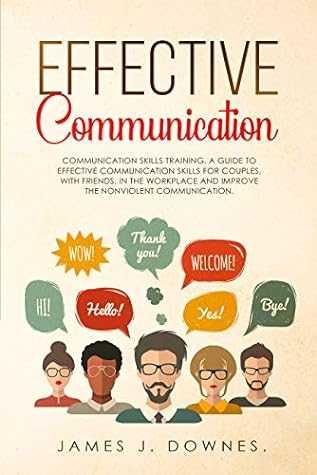Effective communication
Curated from: play.google.com
Ideas, facts & insights covering these topics:
15 ideas
·290 reads
2
Explore the World's Best Ideas
Join today and uncover 100+ curated journeys from 50+ topics. Unlock access to our mobile app with extensive features.
What is communication skills?
Communication skills are the abilities you use when giving and receiving different kinds of information. Some examples include communicating new ideas, feelings or even an update on your project. Communication skills involve listening, speaking, observing and empathising. It is also helpful to understand the differences in how to communicate through face-to-face interactions, phone conversations and digital communications like email and social media.
7
97 reads
Active listening
Active listening means paying close attention to the person who is speaking to you. People who are active listeners are well-regarded by their co-workers because of the attention and respect they offer others. While it seems simple, this is a skill that can be hard to develop and improve. You can be an active listener by focusing on the speaker, avoiding distractions like cell phones, laptops or other projects and by preparing questions, comments or ideas to thoughtfully respond.
7
25 reads
Adapting your communication style to audience
Different styles of communication are appropriate in different situations. To make the best use of your communication skills, it’s important to consider your audience and the most effective format to communicate with them.
For example, if you are communicating with a potential employer, it’s better to send a formal email or call them on the phone. Depending on the situation, you may even need to send a formal, typed letter over other forms of communication.
6
27 reads
Friendliness
In friendships, characteristics such as honesty and kindness often foster trust and understanding. The same characteristics are important in workplace relationships. When you’re working with others, approach your interactions with a positive attitude, keep an open mind and ask questions to help you understand where they’re coming from. Small gestures such as asking someone how they’re doing, smiling as they speak or offering praise for work well done can help you foster productive relationships with both colleagues and managers.
6
20 reads
Confidence
In the workplace, people are more likely to respond to ideas that are presented with confidence. There are many ways to appear confident such as making eye contact when you’re addressing someone, sitting up straight with your shoulders open and preparing ahead of time so your thoughts are polished. You’ll find confident communication comes in handy not just on the job but during the job interview process as well.
6
13 reads
Feedback
Strong communicators can accept critical feedback and provide constructive input to others. Feedback should answer questions, provide solutions or help strengthen the project or topic at hand
6
17 reads
Volume and clarity
When you’re speaking, it’s important to be clear and audible. Adjusting your speaking voice so you can be heard in a variety of settings is a skill and it’s critical to communicating effectively. Speaking too loudly may be disrespectful or awkward in certain settings. If you’re unsure, read the room to see how others are communicating.
6
16 reads
Empathy
Empathy means that you can understand and share the emotions of others. This communication skill is important in both team and one-on-one settings. In both cases, you will need to understand other people’s emotions and select an appropriate response. For example, if someone is expressing anger or frustration, empathy can help you acknowledge and diffuse their emotion. At the same time, being able to understand when someone is feeling positive and enthusiastic can help you get support for your ideas and projects.
6
9 reads
Respect
A key aspect of respect is knowing when to initiate communication and respond. In a team or group setting, allowing others to speak without interruption is seen as a necessary communication skill. Respectfully communicating also means using your time with someone else wisely—staying on topic, asking clear questions and responding fully to any questions you’ve been asked.
7
9 reads
Understanding nonverbal cues
A great deal of communication happens through nonverbal cues such as body language, facial expressions and eye contact. When you’re listening to someone, you should be paying attention to what they’re saying as well as their nonverbal language. By the same measure, you should be conscious of your body language when you’re communicating to ensure you’re sending appropriate cues to others.
6
12 reads
Responsiveness
Whether you’re returning a phone call or sending a reply to an email, fast communicators are viewed as more effective than those who are slow to respond. One method is to consider how long your response will take. Is this a request or question you can answer in the next five minutes? If so, it may be a good idea to address it as soon as you see it. If it’s a more complex request or question, you can still acknowledge that you’ve received the message and let the other person know you will respond in full later.
6
9 reads
Improving communication skills used
- Ask a close friend or colleague for constructive criticism. It can be hard to know how you are perceived as a communicator. To get an objective opinion, ask a trusted friend for their honest feedback. Understanding your areas of improvement for communication can help you identify what to focus on.
- Practice improving communication habits. Many communication skills are habits you have developed over time. You can improve those skills by practising new habits that make you a better communicator. .
6
10 reads
How to highlight communicative skills
You will use your communication skills in every step of the job search and on the job. Everything from your resume to the job interview and beyond will require different types of communication skills. Here are a few ways you can highlight those skills at each step.
6
8 reads
Communication skills for resume
A well-written resume is a demonstration of strong communication skills. Ensure that your resume is structured appropriately and free of spelling and grammar errors. Additionally, you may also want to include some positive communication skills in your resume skills section, especially if the job post calls for specific communication skills in the job description. You can add skills to your Indeed Resume for employers searching for candidates with your skillset.
6
6 reads
Communication skills for covering a letter
Your cover letter is a great opportunity to elaborate on your communication skills. While you can talk more directly about how effectively you communicate here, your cover letter is one of the employer’s first impressions of your skills. You will want to make your cover letter brief, well-written, free of typos and spelling errors and tailored to the position you’re applying for.
6
12 reads
IDEAS CURATED BY
R. Mahesh khanna's ideas are part of this journey:
Learn more about communication with this collection
Strategies for promoting inclusivity
How to address unconscious bias
How to create a diverse and inclusive workplace
Related collections
Similar ideas
6 ideas
2 ideas
Effective communication in remote work
fastcompany.com
Read & Learn
20x Faster
without
deepstash
with
deepstash
with
deepstash
Personalized microlearning
—
100+ Learning Journeys
—
Access to 200,000+ ideas
—
Access to the mobile app
—
Unlimited idea saving
—
—
Unlimited history
—
—
Unlimited listening to ideas
—
—
Downloading & offline access
—
—
Supercharge your mind with one idea per day
Enter your email and spend 1 minute every day to learn something new.
I agree to receive email updates

